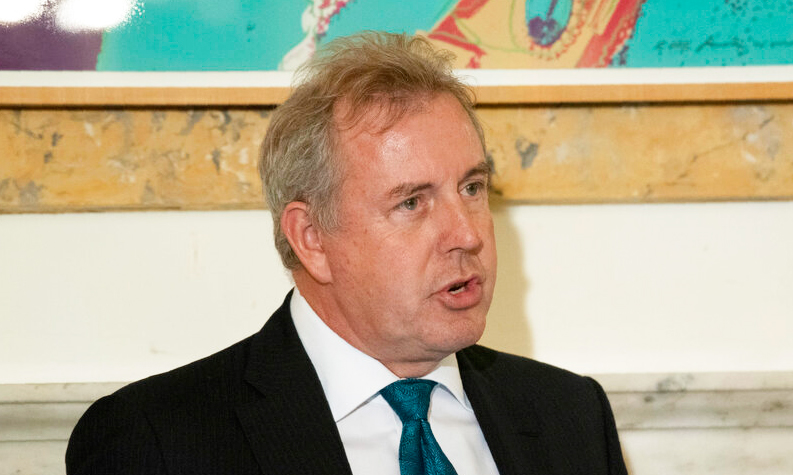Britain said on Monday it had contacted Washington to express regret for the leak of confidential memos in which its ambassador described US President Donald Trump’s administration as “dysfunctional” and “inept”.
The memos from Kim Darroch, ambassador to Washington, were divulged to a Sunday newspaper, annoying Trump and embarrassing London.
“Contact has been made with the Trump administration, setting out our view that we believe the leak is unacceptable,” Prime Minister Theresa May’s spokesman told reporters. “It is, of course, a matter of regret that this has happened.”
Trade minister Liam Fox, who is visiting Washington, told BBC radio he would apologise to Trump’s daughter Ivanka, whom he is supposed to meet.
“I will be apologising for the fact that either our civil service or elements of our political class have not lived up to the expectations that either we have or the US has about their behaviour, which in this particular case has lapsed in a most extraordinary and unacceptable way,” he said.
“Malicious leaks of this nature ... can actually lead to a damage to that relationship, which can therefore affect our wider security interest.”
The revelations come at a time when Britain is hoping to strike a major trade deal with its closest ally after it leaves the EU, an exit currently scheduled for October 31.
Trump told reporters, of Darroch: “We are not big fans of that man and he has not served the UK well, so I can understand and I can say things about him but I won't bother.”
In confidential memos to his government dating from 2017 to the present, Darroch said reports of in-fighting in the White House were “mostly true” and last month described confusion within the administration over Trump’s decision to call off a military strike on Iran.
“We don’t really believe this Administration is going to become substantially more normal; less dysfunctional; less unpredictable; less faction riven; less diplomatically clumsy and inept,” Darroch wrote in one memo.
Ministers said the government did not agree with Darroch, although May’s spokesman said she had full faith in him.
Foreign minister Jeremy Hunt, one of two men who might replace May by the end of the month, said: “I have made it clear that I don’t share the ambassador’s assessment of either the US administration or relations with the US administration, but I do defend his right to make that frank assessment.”
He promised “serious consequences” for whoever who had leaked the memos, telling reporters: “What we will not allow to happen is any interruption in the superb relationship that we have the United States, which is our closest ally around the world.”
Nigel Farage, leader of the Brexit Party and long a thorn in the side of British governments, said figures such as Darroch would be “not be around” if ex-foreign minister Boris Johnson, the other candidate seeking to replace May, was chosen by Conservative Party members.
Despite being close to Trump, Farage ruled himself out of becoming Britain’s next ambassador in Washington.
“I don’t think I’m the right man for that job,” he told BBC radio.
An inquiry is now being held to determine who was behind the second serious disclosure of confidential material this year.
May’s spokesman said if there was evidence of criminality, then the police would be involved.
Two months ago, May fired defence minister Gavin Williamson after secret discussions in the National Security Council about Chinese telecoms firm Huawei were leaked to the media, and an inquiry concluded that he was responsible.
Williamson denied any involvement and police said there was no reason for a criminal investigation.
Ireland will step up its preparations for a disorderly Brexit this week given the chances of Britain leaving the EU without a deal have never been higher, foreign minister Simon Coveney said on Monday.
With close trade links and a shared land border, Ireland is considered the most vulnerable among remaining EU members to Brexit and lawmakers passed one of the largest-ever pieces of legislation in March to prepare as best it could for a no deal.
Coveney said the updated contingency plan will “refine and improve” on the actions already in place for March 29 and April 12, the original Brexit deadlines before Britain was given an extension until the end of October.
“One of the biggest dangers Ireland faces in the weeks ahead is the ‘boy who cried wolf’ effect, whereby people and business assume that because a disorderly Brexit was averted in March and April the same will happen in October.
“To assume this would be a serious error,” Coveney wrote in the Irish Times.










